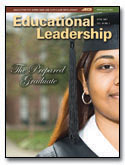Why would Joris Ray, starting out as an ambitious first-year teacher in Memphis City Public Schools, choose to work a second shift in an alternative school? Ray, ASCD's 2006 Outstanding Young Educator, will admit that back in 1996 he never thought he'd end up teaching in alternative education. It was the opportunity to coach a youth basketball team that opened him up to the satisfaction of working with at-risk students. After watching his players grow and succeed under his guidance, says Ray, working with these youth just “seemed like the right fit. I really just wanted to work with the kids who needed it the most.”
Ray believes that giving students a glimpse of success raises their self-esteem and awareness of their future potential. “Once you get students seeing beyond today,” he adds, “they tend to make better choices. They know every step they take is going to hinder their progress or propel them further.”
And that's where our story may have ended. But what's remarkable about Joris Ray is his ability to transfer his passion and vision for struggling students into a statewide agenda. After 10 years as a teacher and then an assistant principal, Ray is now director of Alternative Schools and Programs for the Memphis City Schools, leading the district's efforts to serve disruptive and at-risk youth who have been unable to succeed in traditional schools. Ray focuses on a threefold approach that emphasizes hiring and developing highly qualified teachers and staff, involving parents and caregivers, and building support within the community through a strong service learning component. He believes in setting high expectations for students in alternative schools, and he uses proactive prevention models to intervene early. For example, Ray's Success Schools program creates smaller learning environments within existing schools for students who have not been expelled but who have been identified as at risk through academic or behavior assessments.
Radiating the Verve
“My core philosophy is that successful academics change behavior. It's our mission and our mantra: Every child, every day, college bound.”
As Ray's jurisdiction grew, he found that leadership meant more than just applying his vision; it also meant sharing ownership of that vision with a highly talented staff. So Ray went on radio and cable TV stations to recruit teachers to come to Memphis City Public Schools and work with at-risk youth. Soon, more than 500 educators from across the United States were standing in line to teach in alternative schools.
“There used to be a time,” Ray recalls, “when at-risk settings drew teachers who didn't want to teach and students who didn't want to learn.” In Memphis, those days are long gone. “I've got the best and the brightest teachers and staff,” Ray beams. “And we are fulfilling our mission of making academic achievement goal number one.”
Ray sees the passion and commitment of the professionals working in Memphis alternative schools and the administration that has generously funded his research-based programs as the keystones to effective education for at-risk students. And he makes the distinction that he and his staff are not only workers for alternative schools, but also stakeholders in the future of the Memphis community.
During his tenure as director, the Memphis City Division of Alternative Schools has won more than $250,000 in state and federal grants and hosted the 2006 Tennessee Alternative Education Association Conference. Ray is an active presenter at local, state, and national conferences focusing on education alternatives for at-risk students. He is a product of Memphis City Public Schools, and his son is currently a kindergartner in the school system.
Joris Ray is proof that one educator's vision, articulated to compassionate and qualified faculty and supported by the administration, can recast an often maligned segment of education.What I want to get from all of this is respect for alternative schools. I want us to be in the forefront of academic achievement. I want people to know that we do make a difference. Alternative schools increase the graduation rate; decrease the dropout rate; and help students believe in themselves, be productive, and move forward. For some students, this is the first time they've felt that someone cares about them and wants them to do well. And that's what alternative schools are all about—just an alternate way of teaching students to be successful.”
